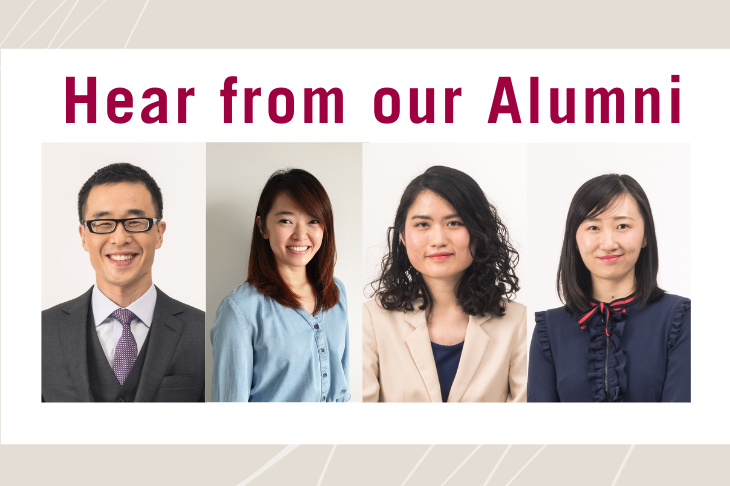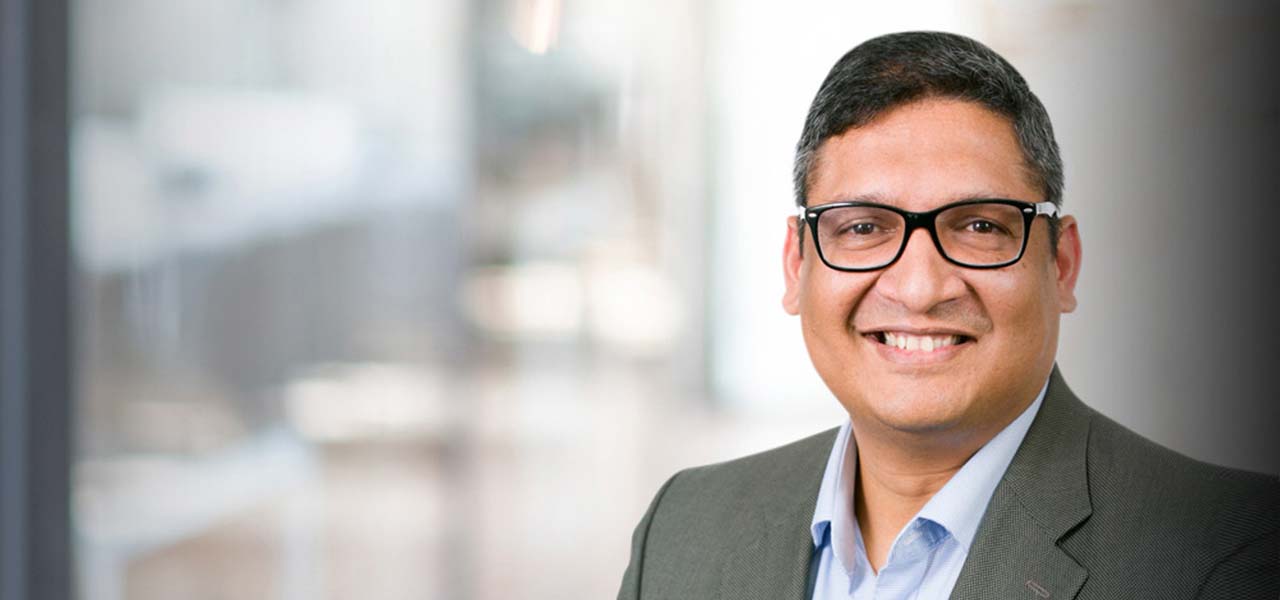Hear from our MPA and MSA alumni on their Accounting Masters' journey.
How do you stay ahead of the competition and increase your employability in a VUCA world? In this #SMUAccountingMasters career and alumni sharing session, our alumni panel share their considerations in choosing the Master of Professional Accounting (MPA) and MSc in Accounting (MSA) programmes and how the MPA and MSA have helped them propel forward and achieve professional growth.
As moderator for the session, Prof Wang Jiwei, Programme Director for both the MPA and MSA programmes began with an introduction of our alumni, highlighting that one of the unique things about SMU is our diversity in the classroom, as seen from the panel present. “The beauty of our programmes is that we combine both our part-time and full-time students so our classes consist of students aged 20 to 50s. Part-time students are relatively more experienced, and full-time students are relatively younger and this creates more synergies between our students.”
Can please give us a short introduction of yourself.
Shawn: I began my career in private practice at a top-tier law firm in Singapore and I specialised as a Capital Markets, Corporate and Regulatory lawyer, and also advised on private investments, before moving on to private equity. I spent 3 years as a managing director in a private investment group with healthcare and real estate investments in the Asia-Pacific, before joining Deloitte SEA at the end of 2018 as the General Counsel for Southeast Asia, to assist in building the Office of the General Counsel (SEA OGC) for the region to support Deloitte’s business in SEA.
Reyna: I did not come from a business or accounting world, but I used to take part in a lot of startup competitions during my undergraduate studies. I then joined IBM as I wanted to acquire practical and hands-on business management and accounting skills to really enter the startup world. After I graduated from SMU MPA, I joined a startup company – ByteDance, developer of the TikTok app as I wanted to see how I can leverage the knowledge learned in school to start a new business in a startup company. I am now with a startup database company.
Margaret: I am currently an audit senior in Deloitte Singapore, and I was from the MPA programme, Class of 2018. I was an SMU ASEAN Scholarship recipient and personally, that was a great accomplishment as it demonstrates the competitive value that I have and an accomplishment that will add value to my career. Having the scholarship was also a personal reminder to make sure I could maintain a good performance and stay competitive in my studies.
Shun Min: I am from MSA 2019 intake. I started my career as an auditor, after 3 years I moved into an international law firm as an in-house finance accountant/analyst for about 5 years. I wanted to upskill myself and make myself relevant and be what the industry is looking for, so I took up the MSA course. It was a good opportunity for me in terms of having a career switch. I am also a recipient of the UOB-MSA Scholarship which I am very grateful for. I am now working with UOB as a Data Analyst in the Data Management Office, Enterprise Data Strategy & Analytics team.
What were your career aspirations or goals, why did you decide to join the MPA or MSA programme and how did your degree help you achieve that?
Shawn: Students who are not from accounting may be interested in my perspective as I am a lawyer by training and I am a specialist in the law of corporate finance. I felt I had gaps in my understanding when I spoke with bankers and auditors regarding the accounting, audit and financial aspects of a corporate finance transaction and I wanted to fill those knowledge gaps. For those of you involved in businesses or want to understand more about business, then accounting is a common language that cuts across many areas in a company’s business in any industry. I felt it was important for me to understand the language better and thought that MPA fulfilled that goal. Also, as a lawyer, I am comfortable with qualitative thinking, but the MPA helped to enhance my quantitative reasoning.
Shawn, I remember we had a talk during your admission and at that time you were deciding between a more general course such as the MBA and a more specialised course such as the MPA. Do you have more insights to share on why you decided on a more specialised course?
Shawn: When I looked at the different courses and modules that were offered, I felt like the balance was correct. The MBA and MPA programmes cover the similar subject matter, but the difference is the focus and the depth. I felt it was useful to understand certain subjects more deeply and in the case of MPA, there was a very deep technical focus on accounting, as well as financial management. The internet can never give you an in-depth understanding of any particular financial or accounting area and I realized that. Also, the opportunity to get a professional qualification was too good to pass. I finally decided on applying to SMU MPA, not only because it had an attractive, comprehensive programme, but SMU felt very fresh and innovative, and its energy impressed me.
Thank you, Shawn. We are not saying that general courses are not good. At SMU, we have both general and specialised programmes. It is all a matter of preference, your background and what you hope to achieve eventually. Reyna, can you also share why you chose a specialised programme?
Reyna: In a startup company, you must have multi-disciplinary knowledge to help you set up a programme or go for a roadshow. I wanted more solid knowledge on how to value a product, to do the financial forecast as well as value a business case. I chose MPA as I wanted solid knowledge to equip myself to not only be a manager but also to be a business owner.
I remember you discussing your entrepreneurial projects and how the programme can support you in your entrepreneurial role. I do agree that entrepreneurs should have accounting knowledge. Let us move to Margaret, can you share after a few years of studying and working, how has the MPA helped you in your career aspirations?
Margaret: It was challenging for me when I first moved to Singapore from Indonesia as it is quite a competitive landscape. Even though I had some accounting experience like my Bachelor degree and my working experience, I was still not very confident in accounting itself, so I felt like the MPA could help me get a higher level of understanding in accounting. I too was considering between MBA and MPA but decided on the MPA because my goal was to have a career switch from an accountant to an auditor, and it gave me the required knowledge and advanced understanding of the profession itself. SMU MPA, in a way, provided me the security in my decision to switch my career, as it helped to compensate for the knowledge which I lacked at that time.
Shun Min, do you have anything to share as you also made a career switch. What are your thoughts now and how do you think this has helped with your career?
Shun Min: I was from a pure finance industry for about 8.5 years, but I decided to make a switch as with all these industry revolutions and big data coming along, finance functions are becoming more analytical. Technology will help to push the accounting and finance department from being reactionary and transactional kind of work to more proactive and analytical. Instead of bookkeeping which can be automated, what they hope to see in the future is to see accountants doing more high-level work using technology such as using AI tools to analyse data and come up with more insights.
When I made the career switch, the industry was also starting to pick up and show more interest in data analytics. So, there is more demand for accounting professional with a hybrid of technological skills. But in the local market, there is a shortage of such a hybrid skill. It was the right decision to choose MSA as the curriculum exposes us to different programming languages relevant in today’s analytics world. There are also modules that delve in to honing one’s analytical skills such as ‘Forecasting and Forensic Analytics’ taught by Prof Wang, ‘Analytics for Financial Instruments’ where we learn to use R and Python to apply different Machine Learning models to solve problems. This programme also exposed me to data visualizations and dashboards which is a highly sought-after skill for management reporting as the visualisations help identify trends and insights that tell a story and allow management to make informed decisions. My current role as a data analyst in UOB requires me to build dashboards using BI tools such as Tableau or Microsoft Power BI. Taking up this course has enhanced my employability in the finance industry and has kept me relevant.
Thank you, Shun Min. This is exactly why we started MSA as we saw the changes and needs of the industry. We are happy to see the expansion of the MSA programme in the past 3 years. Now let us move on to the next question, during your stint with SMU, did you encounter any significant challenges or highlights?
Shawn: To keep it real, it is a professional course, so it is not easy by definition (otherwise it would not be a professional course). The faculty connected me with people who had gone through the course and I also had colleagues who had graduated from the course and one of them said to me that in order to do this programme, “you have to enjoy studying”. And for those doing it part-time, you need to talk to your family members and get the support as you will spend weekends preparing for assignments and projects. I remember struggling with the time commitment and rushing to school from work. The other highlight is the support from the professors who know you are a part-time student. The programme really gave me a solid foundation of financial and accounting literacy. I can walk into any business situation now and be comfortable that I have the knowledge and the tools I picked up from my degree to deal with the issues.
Thank you, Shawn. I think you brought up a very good point particularly for our part-time students. This is something we always have to highlight to them during the admissions interview that this is a professional course and we need to impart professional knowledge to them so it will be rigorous training. Reyna, would you like to add on?
Reyna: The design of the MPA programme is very good. From solid accounting knowledge and financial planning to accounting information system. The career talks and workshops are also very well designed as well. My suggestion to students is not to stay in the library. If you are in a postgraduate programme and want to have some progress in your career, you should participate more in the workshops, career talks and school activities so you can network. My advice is to not focus so much on scoring As but more on applying what you have learnt in class to your job.
We are not a GPA-driven programme. Our part-time students especially have to learn how to have a balance since they are working and taking a hard-core professional degree. It is indeed challenging, but you guys have done it. Time management is key for all our students as you have different challenges. You need to have good expectations and mindset on how much time to dedicate to this programme. Margaret, do you have anything to share as well?
Margaret: Joining the SMU MPA programme as a full-time student, was an intense year. A lot of late nights at school, especially towards the end of the semester as we were busy preparing for exam and group projects. It was also a mix of fun with a lot of non-academic related activities which was a break from studies and projects. There were a lot of seminars, events, talks which is also another opportunity to broaden our network. Challenges came mainly from time management. Particularly towards the end of the programme, there were subjects which were more advanced, and in order to participate actively during the class, preparation was required. A few suggestions to overcome this is to manage your priorities and to have a clear agenda of what should be accomplished within a specified time.
I agree studies are important, but it is not just about studying constantly. Not just on the programme level but on a university level, we have a lot of student activities held. You must try to attend those that are of interest to you. For example, with all the changes in technology and the industry landscape, we typically invite speakers to talk about transformation and changes in the accounting and finance sector. This will really help you to expand your mind and broaden your knowledge. For instance, we have a collaboration with Apple in Shanghai, and they want to recruit some of our MPA and MSA students as interns. They asked our students to prepare for a presentation on what they thought about AI and how they think AI can be applied in the accounting and finance domain. The talks we have arranged for our students include such information and if you have attended the talks and programme activities, you would have good takeaways to prepare for such interview questions. The message here is do not focus on just studying, mingle with your classmates, be social and maximise your experience with SMU. We have a lot of opportunities for you. Shun Min, would you like to share some pointers as well.
Shun Min: One of the takeaways I had was the networking opportunities and building of relationships. Like Prof Wang said, there is a diverse group of people in the classroom, I was lucky to work on a project with people who hold senior roles in their companies, there is so much to learn from them. And being a mid-career individual, I too was also able to provide guidance to fresh graduates. There is a good balance and you also learn how to coach people.
I was also the President of the Class Committee, so I agree with what Prof Wang said about not just studying. After being in the corporate world for so long and coming back to school - there is definitely a transition. But what I really enjoyed is being a student and taking part in school activities all over again. Our class committee also organised several activities to let our class and cohort bond. One of the challenges our batch faced was during the COVID-19 Circuit Breaker period, all classes went online, and we were not able to meet friends in person or during lectures, so what we did was organised a virtual gaming session on ZOOM and we played some games to bond despite the pandemic and challenges we face. Being awarded the scholarship also settled my financial worries.
You certainly deserve it, Shun Min. Thanks for reminding me of the Class Committee. This is another thing unique to MPA and MSA within SMU. We set up a voluntary committee and the objective is for our students to bond outside of the classroom as well.
Shun Min: The program has been rewarding as it introduced new elements and technical skills in the finance world that I was not previously exposed to. Apart from learning, it is also about meeting people and building relationships. The curriculum encourages peer learning through projects and given the varied backgrounds of the students, I was able to learn from seniors who are CFOs and Directors in their respective industry, and also have the opportunity to guide those who were more junior than me. I also took on the role of the President of the Class Committee. Together with my team, we organised several physical and virtual social activities to help the cohort bond.
Any last piece of advice you can give the audience here as they decide to get a Master’s degree?
Shawn: If you are comparing this programme with others, one thing I would like to flag out which has been very good for the MPA and is not reflected in the brochure is that the faculty is very supportive especially if you are doing it part-time. I emphasize it and I am very grateful to the faculty for providing flexibility and adjusting the courses and being willing to look into our personal circumstances to try and help. This is something I want to call out and my way of telling the faculty, thanks for all the support.
We have a question from the audience. What is the average workload per week and are the courses 100% exam based?
Shun Min: During the first semester, I was taking 4 modules so that is 4 days out of a 5-day week. And all 4 modules included projects. So nearing mid-term and project submissions, it was equivalent to normal working hours as there are group discussions and project preparations. So, it is like the same as working hours but more enjoyable as this is something you are doing for yourself and not for the company.
Shawn: Courses are 3 hours, the minimum requirement to complete homework and considering the project discussions and time, you would need to spend an additional 4 hours per module per week, at least.
For MPA, as it is a professional qualification programme, the professional certification requires our final exams to comprise at least 50% of the total assessment. At SMU, we do not look at just exams, the other components are class participation, progress assessments (weekly pop-up quiz, individual assignments – any form of continuous assessment) and the remaining is a project either in the form of a written report and/or a class presentation. We have another question for Shun Min, she was in a pure accounting role for 8 years and did not have much programming and analytics knowledge. What were the challenges like and how did she go about tackling them?
Shun Min: Before I started the programme, I was taking some external Python courses which really helped me. What the school curriculum offers is sufficient to tide you through. In addition to the curriculum, the school also provides you with a DataCamp membership. DataCamp is a platform that has e-learning courses to learn about learning python and R programming. These tools enhance your programming skills. Apart from lectures, you still have to do some hands-on programming yourself. Understanding the basic syntax is important. Try to grasp the syntax of the programming language as much as you can as it gets harder at the more advanced level.
Programming background is not compulsory for our MSA students but moving forward we will require students to take some online courses before they join the programme. We find that without the pre-course training, some students find it hard to adapt to a new environment as it is like learning a foreign language. From the 2021 intake, we will send students pre-reading materials which they have to complete before they embark on their journey with SMU.
For more information on SMU Accounting Masters, please contact:
Master of Professional Accounting (MPA): mpa@smu.edu.sg or visit masters.smu.edu.sg/programme/master-of-professional-accounting
MSc in Accounting (Data & Analytics) (MSA): msa@smu.edu.sg or masters.smu.edu.sg/programme/master-in-accounting





